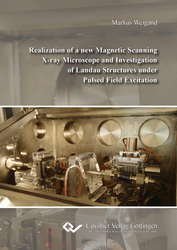| Areas | |
|---|---|
| Serie de libros (96) |
1381
|
| Nachhaltigkeit |
3
|
| Gesundheitswesen |
1
|
| Letra |
2370
|
| Ciencias Naturales |
5408
|
| Matemática | 229 |
| Informática | 319 |
| Física | 980 |
| Química | 1364 |
| Geociencias | 131 |
| Medicina humana | 243 |
| Estomatología | 10 |
| Veterinaria | 108 |
| Farmacia | 147 |
| Biología | 835 |
| Bioquímica, biología molecular, tecnología genética | 121 |
| Biofísica | 25 |
| Nutrición | 45 |
| Agricultura | 1005 |
| Silvicultura | 201 |
| Horticultura | 20 |
| Ecología y conservación de la tierra | 148 |
| Ciencias Ingeniería |
1795
|
| General |
98
|
|
Leitlinien Unfallchirurgie
5. Auflage bestellen |
|
Erweiterte Suche
Realization of a new Magnetic Scanning X-ray Microscope and Investigation of Landau Structures under Pulsed Field Excitation (Tienda española)
Markus Weigand (Autor)Previo
Indice, PDF (62 KB)
Lectura de prueba, PDF (380 KB)
Magnetic nanostructures in thin films and their behavior have seen a drastic increase in scientific interest in the last decades. Similarly, X-ray microscopy has moved into the spotlight since the turn of the century. This thesis combines both topics with the investigation of magnetic vortex structures under pulsed field excitation using both micromagnetic simulations and time resolved magnetic X-ray microscopy. This allowed the observation of vortex core polarization switches with <30nm spatial and <100ps time resolution as well as the discovery of easy switching regions in terms of pulse length. The results were used to develop excitation schemes for circular pulsed switching that allow lower thresholds or residual motion quenching.
Additionally, within this thesis a new scanning X-ray microscope was commissioned and operated at Bessy II, Berlin. This included development of a time resolved excitation setup and in particular a detailed investigation of the avalanche photodiodes (APDs) and their abilities as fast and efficient single photon detectors in the soft X-ray range.
| ISBN-13 (Impresion) | 9783954049912 |
| ISBN-13 (E-Book) | 9783736949911 |
| Formato | A5 |
| Idioma | Inglés |
| Numero de paginas | 320 |
| Laminacion de la cubierta | mate |
| Edicion | 1. Aufl. |
| Lugar de publicacion | Göttingen |
| Lugar de la disertacion | Stuttgart |
| Fecha de publicacion | 05.05.2015 |
| Clasificacion simple | Tesis doctoral |
| Area |
Física
Física de materia condensada ( incluyendo física de cuerpos solidos, optica) |
| Palabras claves | X-ray, Microscopy, XMCD, magnetism |








